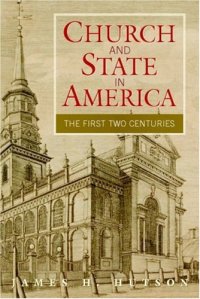
Ebook: Church and State in America: The First Two Centuries (Cambridge Essential Histories)
Author: James H. Hutson
- Genre: History
- Series: Cambridge Essential Histories
- Year: 2007
- Publisher: Cambridge University Press
- Language: English
- pdf
I have read a number of books on America's religious history particularly in the Colonial and Revolutionary periods and this is one of the best by far. Even though it is brief, it is comprehensive in scope, giving just enough details to give a full picture of the issues without being superficial. The book is scholarly (Hutson is the Chief of the Manuscripts Division at the Library of Congress), yet very readable and in fact enjoyable. I could not put the book down. He covers a number of fascinating details I had not encountered elsewhere in the debate on church and state. For example, Hutson was involved in the recovery of a blackened out portion of Jefferson's letter to the Danbury Baptist Association in which the famous phrase "Wall of separation between church and state" appears. With the help of the FBI, in 1998, they uncovered deleted portions of Jefferson's letter that casts a whole new light on what he meant by this phrase. The portion was struck out before being published upon advice of his attorney general for fear that it might have political repercusions. It appears Jefferson limited his understanding of the phrase to the function the president serves in matters of religion, not the government as a whole.
Hutson makes a good case that the Supreme Court cases in the late 19th century and mid-20th century have misread the issue employing Jefferson's phrase in a way that ignores contrary evidence. The fact that states like Connecticut, New Hampshire and Massachusetts maintained state sponsored church establishments through the early 19th century clearly indicates that the Establishment Clause of the First Amendment did not rule out religious establishments in the individual states. Had that been the understanding, few states would have ratified the Constitution. Furthermore, Congress funded the publishing of Bibles as well as the proselytizing of Indians in the early Republic. Regular church services were held in the House chambers until after the Civil War. In fact, Jefferson himself, no friend of orthodox Protestantism, regularly attended these services. Furthermore, church services were also held in the chambers of the Supreme Court. Those who espouse "strict" separation often ignore these facts. Hutson points them out as well as many others.
This book changed my thinking on some key issues in this debate. I highly recommend it.
Hutson makes a good case that the Supreme Court cases in the late 19th century and mid-20th century have misread the issue employing Jefferson's phrase in a way that ignores contrary evidence. The fact that states like Connecticut, New Hampshire and Massachusetts maintained state sponsored church establishments through the early 19th century clearly indicates that the Establishment Clause of the First Amendment did not rule out religious establishments in the individual states. Had that been the understanding, few states would have ratified the Constitution. Furthermore, Congress funded the publishing of Bibles as well as the proselytizing of Indians in the early Republic. Regular church services were held in the House chambers until after the Civil War. In fact, Jefferson himself, no friend of orthodox Protestantism, regularly attended these services. Furthermore, church services were also held in the chambers of the Supreme Court. Those who espouse "strict" separation often ignore these facts. Hutson points them out as well as many others.
This book changed my thinking on some key issues in this debate. I highly recommend it.
Download the book Church and State in America: The First Two Centuries (Cambridge Essential Histories) for free or read online
Continue reading on any device:

Last viewed books
Related books
{related-news}
Comments (0)